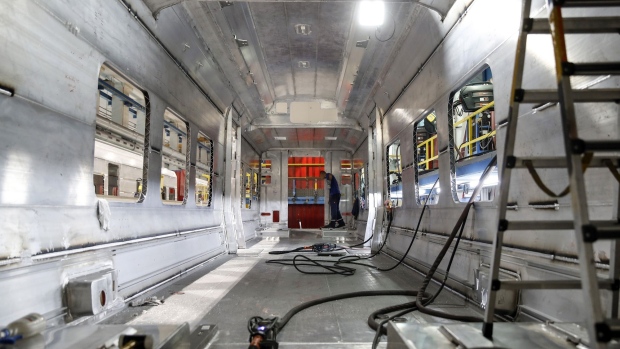Jan 27, 2021
Orban Ally Bolsters International Reach With Stadler Rail Deal
, Bloomberg News

(Bloomberg) -- A Hungarian conglomerate controlled by Prime Minister Viktor Orban’s closest business ally bolstered its international ambitions through a partnership with Swiss-based Stadler Rail AG. Stadler shares headed for their biggest gain in almost a year.
Meszaros Group and Stadler are entering a joint venture to build a Hungarian factory to produce rail cargo cars for the domestic and international markets, according to a statement on Wednesday. The Hungarian company is helping build the $2 billion Budapest-Belgrade cargo line that forms part of China’s Belt and Road infrastructure initiative.
Meszaros Group, which has investments in construction, energy, tourism, banking and media, has seen its businesses grow exponentially since Orban had a falling out in 2015 with a previous ally. The company is part of a business empire that’s recently set its sights on expansion outside Hungary.
Since then, companies connected to Lorinc Meszaros, a childhood friend of Orban and a former ruling-party mayor of his hometown, have been flooded with state subsidies, European Union funding and government contracts. Orban and Meszaros have repeatedly denied any business links.
Stadler is controlled by billionaire Peter Spuhler, who’s recently been criticized for his association with another controversial leader in eastern Europe. In 2013, Stadler Rail built a plant near Minsk, Belarus, which employs more than 1,500 people. Non-governmental organizations have asked Stadler to distance itself from President Alexander Lukashenko, Swiss media reported.
“It’s not the job of a Swiss company to comment on political developments in other countries,” a spokesman for Stadler Rail said by email.
Hungary is familiar turf for Stadler, which already owns factories in the country that repair and produce rail cars for public transport and employ about 800 people.
The company’s shares rose as much as 7.6% in Zurich, the most since March on a closing basis.
Hungary has plunged more than any other European Union nation in the annual corruption index compiled by Transparency International, which has cited institutional corruption that’s “unique” in the bloc.
©2021 Bloomberg L.P.







